Let me tell you why AI won’t become “conscious”

|
Will super artificial intelligence with self-awareness and emotions ever appear? To be honest, this topic has become a hot topic. Scientists, technology giants, and politicians from various countries have argued bitterly, and we can never know the answer. But what we want to say is that everything should be based on logic. Are there any theories or conjectures that can trigger the topic of AI awakening? Are there any theories or conjectures that will allow us to imagine the future of artificial intelligence without being confused or overly enthusiastic? Coincidentally, there are indeed some such theories, such as the famous "Chinese Room Paradox". This scenario conjecture is used to negate the "Turing Test" in most cases. But its deeper meaning is actually to explain that artificial intelligence can never have self-awareness like humans. What is the "Chinese Room Paradox" The so-called "Chinese Room Experiment" is a thought experiment proposed by American philosopher John Searle in a paper published in 1980. This thought experiment says that if a person who only speaks English is locked in a closed room, he can only communicate with the outside world by passing notes through a small hole in the wall, and all the notes passed in from outside are written in Chinese. This person brings a book with a Chinese translation program, and there are enough manuscript paper, pencils and cabinets in the room. Then, using the Chinese translation program, this person can translate the incoming text into English, and then use the program to translate his own reply into Chinese and send it out. In this scenario, people outside will think that the person in the room is fully proficient in Chinese, but in fact this person can only operate the translation tool and knows nothing about Chinese. Of course, this is a thought experiment, and it is almost impossible to implement it. But the idea behind this experiment is to express the possibility that the intelligence (understanding Chinese) shown by the machine is probably just an illusion brought by the translation program, and it actually knows nothing about real human intelligence. This experiment was originally intended to refute the Turing test, arguing that even if a machine passes the Turing test, it does not necessarily have intelligence. But it is more or less far-fetched, and the Turing test has never been completely refuted. However, the "Chinese Room Paradox" may tell us another thing on the road of technological development: all our technological exploration and research may be to improve the Chinese-English translation program, and never to teach machines real intelligence. The boundary between general artificial intelligence and strong artificial intelligence Here we need to introduce two concepts that are often heard but may be confused: general artificial intelligence and strong artificial intelligence. Artificial General Intelligence (AGI) refers to artificial intelligence technology that can handle a variety of or even generalized problems without specifically encoding knowledge and application areas. Although this technology is unpopular and far-flung, it is actually being developed by many academic institutions and companies, and is generally considered to be the future development direction of artificial intelligence technology. Strong Artificial Intelligence is the level of artificial intelligence that John Searle set when he proposed the "Chinese Room Experiment". This level of artificial intelligence must not only have certain human abilities, but also have perception, self-awareness, and the ability to think independently and solve problems. Although both concepts seem to correspond to the problem-solving ability of artificial intelligence, we can imagine the former as an omnipotent computer and the latter as a human wearing Iron Man armor. The idea expressed by the "Chinese Room Paradox" is that the direction of human research is simply not close to strong artificial intelligence. Even if general artificial intelligence can meet all human needs, there is no progressive relationship between it and strong artificial intelligence with self-awareness. The technological development in reality seems to be like this. In the field of general artificial intelligence, humans have proposed some ideas and architecture models. The most famous one should be AIXI proposed by Marcus Hutter, a scholar at the Australian National University in 2000. This computational model is said to cover various algorithms and technologies and approach the essence of general artificial intelligence... Of course, this algorithm is so complex that it cannot be executed at all, so it is just a concept. Companies such as OpenAI and DeepMind have begun specific AGI research in the past two years, among which DeepMind is considered to be the pioneer that will inherit AIXI. From the research and experiments on general artificial intelligence conducted by DeepMind, we can see that its "generality" is mainly concentrated in four aspects: intelligent agents coping with complex environments, handling unfamiliar environments, coping with time variables, and processing tasks with multiple information sources simultaneously. And all these technologies point in the same direction, which is the interaction between intelligent agents and the outside world - perhaps it can be understood as a translation program between AI and the world? In other words, what humans have done is just to give "that person" a better translation program, rather than teaching him Chinese (which of course cannot be taught). Therefore, general intelligence, which is already a very mysterious thing, still maintains a clear boundary with strong artificial intelligence. Desperate strong AI: Ability and consciousness may be poles apart Let’s take the Chinese Room Experiment to the extreme and put the entire room inside a person’s brain. If a person memorizes all the translation programs, and can recall any Chinese words and write corresponding answers, does he understand Chinese? For humans, he may understand Chinese naturally. But for machines, no matter how fast and sensitive the process is, it still does not understand any Chinese characters. To be precise, this person (the agent) acquires the ability to use Chinese, but he (it) has no awareness of Chinese. The difference between ability and consciousness is the most confusing issue when we imagine future super intelligence. But from the logical reasoning of reality, we will find that the two are very different and almost unrelated. Artificial intelligence technologies such as knowledge representation, machine learning, NLP, etc. are only constantly strengthening the ability of artificial intelligence to imitate humans (this sentence is a bit confusing), but allowing artificial intelligence to imitate human consciousness is still a blank until now. Without cause, there will be no effect. The Chinese Room Theory states that, according to the technological trajectory followed by humans, the proposition of the rise of consciousness of intelligent entities will always lack the basic conditions. If this conclusion is true, then it is hopeless for strong artificial intelligence. They can only continue to sleep in the long river of time and space. In human imagination, they are like ancient gods and ghosts in urban legends. Come to think of it, I still find it quite boring. As a winner of Toutiao's Qingyun Plan and Baijiahao's Bai+ Plan, the 2019 Baidu Digital Author of the Year, the Baijiahao's Most Popular Author in the Technology Field, the 2019 Sogou Technology and Culture Author, and the 2021 Baijiahao Quarterly Influential Creator, he has won many awards, including the 2013 Sohu Best Industry Media Person, the 2015 China New Media Entrepreneurship Competition Beijing Third Place, the 2015 Guangmang Experience Award, the 2015 China New Media Entrepreneurship Competition Finals Third Place, and the 2018 Baidu Dynamic Annual Powerful Celebrity. |
<<: Self-driving cars need to go through 15 challenges before they can “help everyone”
Recommend
Have you checked out these 9 kinds of autumn leaf trees this fall?
This fall, which popular tourist spots suitable f...
An article to clarify the ranking issues of bidding ads
In the early years, when Baidu bidding had not ye...
How can your product improve conversion rates?
Marketing is like cooking Chinese food. The same ...
Four channels and strategies for traffic acquisition
In the Internet age, whether it is e-commerce or ...
6.18 How to use Taobao public domain traffic?
Although there is still a month to go until June ...
Family dad car, eπ008 and Leapmotor C16, which one is the better replacement for Ideal L8
In the Chinese car market, what car can you buy w...
This winter "seasonal fruit" is available online, but many people have a "fear of buying"? Teach you how to choose →
Winter is coming, and it is the best time to eat ...
How to solve the high user churn rate? Here are 10 strategies
Many companies have not developed specific plans ...
How should Cordyceps sinensis be stored in the refrigerator? Should Cordyceps sinensis be refrigerated?
Can Cordyceps sinensis be stored in the refrigera...
Human body science: Why do girls’ breasts become soft and hard at times?
Follow "Body Code Decoding Bureau" (pub...
When it grows up, it eats the brain and turns into a plant. Why does the tunicate hate itself so much?
If we say that "survival" and "rep...
Why is marijuana banned?
Marijuana is listed as one of the world's thr...
When pre-prepared dishes appear on the New Year’s Eve dinner table, what will you choose?
Pre-prepared meals are popular among many consume...
Wang Yuquan_QianShao Technology Training Camp Baidu Cloud Download
Wang Yuquan · Qianshao Technology Training Camp R...









